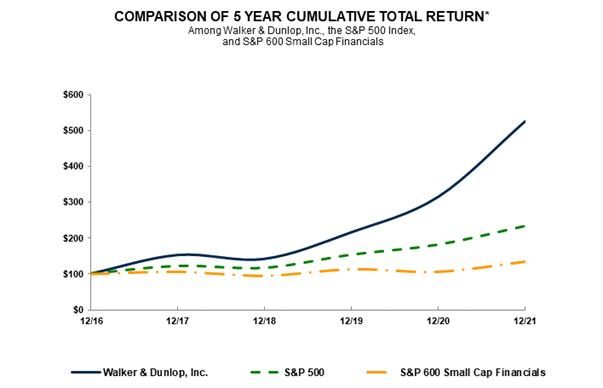Capital; and Berkadia Commercial Mortgage, LLC. Many of these competitors enjoy advantages over us, including greater name recognition, financial resources, well-established investment management platforms, and access to lower-cost capital. The commercial real estate services subsidiaries of the large national commercial banks may have an advantage over us in originating commercial loans if borrowers already have other lending or deposit relationships with the bank. With the acquisition of Alliant in December 2021, we became the sixth largest LIHTC syndicator in the country. Competitors in this fragmented but highly competitive industry include but are not limited to: Boston Financial Investment Management, L.P., Raymond James & Associates, Inc., Enterprise Community Partners, Inc., The Richman Group Affordable Housing Corporation, National Equity Fund, Inc., and PNC Real Estate.
We compete on the basis of quality of service, the ability to provide useful insights to our borrowers, speed of execution, relationships, loan structure, terms, pricing, and breadth of product offerings. Our ability to provide useful insights to borrowers includes our knowledge of local and national real estate market conditions, our loan product expertise, our analysis and management of credit risk and leveraging data and technology to bring ideas to our clients. Our competitors seek to compete aggressively on these factors. Our success depends on our ability to offer attractive loan products, provide superior service, demonstrate industry depth, maintain and capitalize on relationships with investors, borrowers, and key loan correspondents, and remain competitive in pricing. In addition, future changes in laws, regulations, and Agency program requirements, increased investment from foreign entities, and consolidation in the commercial real estate finance market could lead to the entry of more competitors.
Regulatory Requirements
Our business is subject to laws and regulations in a number of jurisdictions. The level of regulation and supervision to which we are subject varies from jurisdiction to jurisdiction and is based on the type of business activities involved. The regulatory requirements that apply to our activities are subject to change from time to time and may become more restrictive, making our compliance with applicable requirements more difficult or expensive or otherwise restricting our ability to conduct our business in the manner that it is now conducted. Additionally, as we expand into new operations, we likely will face new regulatory requirements applicable to such operations. For example, our expansion into LIHTC syndication and broker-dealer activities in 2021, as a result of the Alliant and Zelman acquisitions, has subjected us to new regulatory requirements. While such regulatory requirements may not result in fines and penalties, changes in applicable regulatory requirements, including changes in their enforcement, could materially and adversely affect us.
Federal and State Regulation of Commercial Real Estate Lending Activities
Our multifamily and commercial real estate lending, servicing, asset management, and appraisal activities are subject, in certain instances, to supervision and regulation by federal and state governmental authorities in the United States. In addition, these activities may be subject to various laws and judicial and administrative decisions imposing various requirements and restrictions, which, among other things, regulate lending activities, regulate conduct with borrowers, establish maximum interest rates, finance charges, and other charges and require disclosures to borrowers. Although most states do not regulate commercial finance, certain states impose limitations on interest rates, as well as other charges on certain collection practices and creditor remedies. Some states also require licensing of lenders, loan brokers, loan servicers and real estate appraisers as well as adequate disclosure of certain contract terms. We also are required to comply with certain provisions of, among other statutes and regulations, the USA PATRIOT Act, regulations promulgated by the Office of Foreign Asset Control, the Employee Retirement Income Security Act of 1974, as amended, which we refer to as “ERISA,” and federal and state securities laws and regulations.
Requirements of the Agencies
To maintain our status as an approved lender for Fannie Mae and Freddie Mac and as a HUD-approved mortgagee and issuer of Ginnie Mae securities, we are required to meet and maintain various eligibility criteria established by the Agencies, such as minimum net worth, operational liquidity and collateral requirements, and compliance with reporting requirements. We also are required to originate our loans and perform our loan servicing functions in accordance with the applicable program requirements and guidelines established by the Agencies. If we fail to comply with the requirements of any of these programs, the Agencies may terminate or withdraw our approval. In addition, the Agencies have the authority under their guidelines to terminate a lender's authority to sell loans to them and service their loans. The loss of one or more of these approvals would have a material adverse impact on us and could result in further disqualification with other counterparties, and we may be required to obtain additional state lender or mortgage banker licensing to originate loans if that status is revoked.
Investment Advisers Act
Under the Investment Advisers Act of 1940, WDIP is required to be registered as an investment adviser with the Securities and Exchange Commission (“SEC”) and follow the various rules and regulations applicable to investment advisers. These rules and regulations cover, among other areas, communications with investors, marketing materials provided to potential investors, disclosure and calculation of fees, calculation and reporting of performance information, maintenance of books and records, and custody. Investment advisers are also subject to periodic inspection and examination by the SEC and filing requirements on Form ADV and Form PF. Should WDIP not meet any of the requirements

